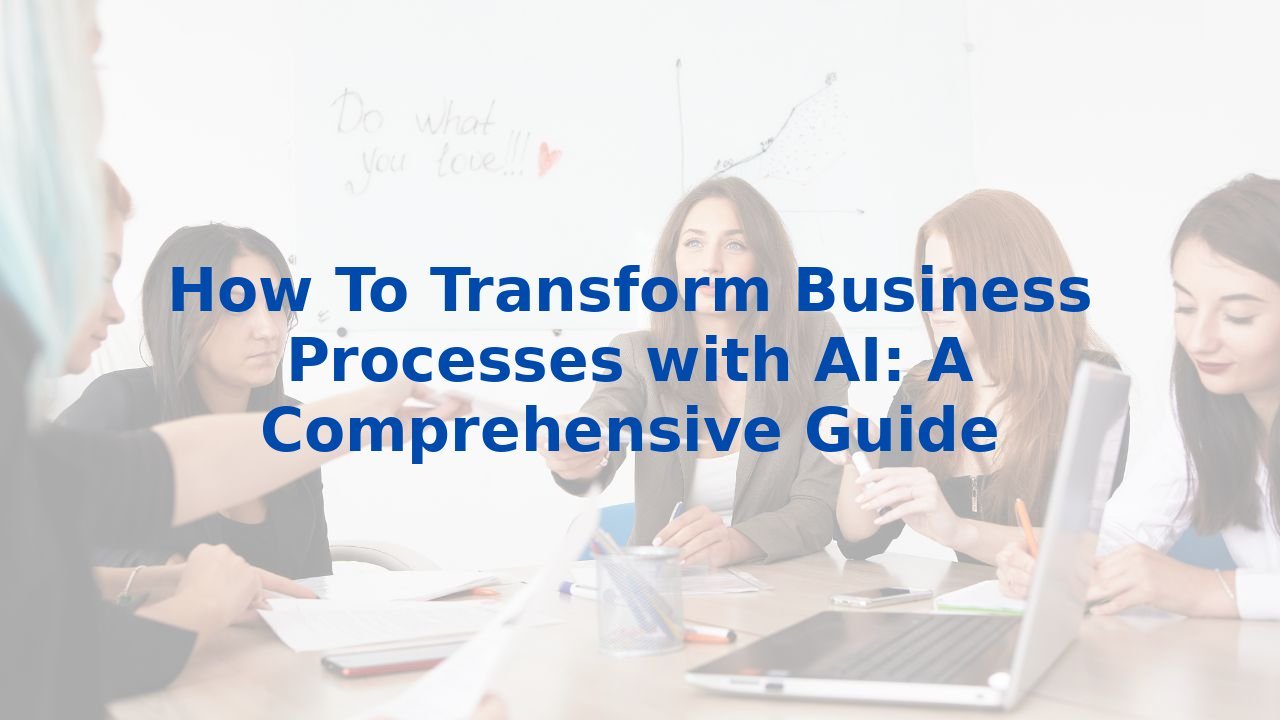How to Transform Business Processes with AI: A Comprehensive Guide
How to Transform Business Processes with AI: A Comprehensive Guide
In an age where technological advancements are reshaping our world, the integration of artificial intelligence (AI) in business process management (BPM) sets the stage for revolutionary transformations. Companies are beginning to recognize that AI is not merely a buzzword; it’s a dynamic component that enhances operational efficiency and propels organizations forward. Let’s explore how AI can elevate your business processes to new heights.
Enhancing Business Processes with AI
1. Process Discovery and Mapping
Every successful transformation begins with a clear understanding of what currently exists. Process discovery involves utilizing AI techniques, such as process mining and natural language processing, to uncover the intricate details of a company's operational workflows. In this phase, hidden inefficiencies and bottlenecks are brought to light, allowing organizations to envision a more efficient future.
Following discovery, process mapping comes into play. AI analyzes real-time data to generate accurate and up-to-date process maps. These visuals not only depict workflows but also highlight areas ripe for improvement, enabling teams to strategize effectively.
2. Process Automation
One of AI's most beneficial capabilities is automation. By employing AI bots to handle mundane tasks—be it data entry or customer inquiries—organizations can enhance operational efficiency. This shift allows human employees to invest their time and energy in more strategic initiatives, fostering a workplace where innovative thinking can thrive.
3. Process Improvement
Navigating the journey of continuous improvement is a cornerstone of successful BPM. AI facilitates this by offering real-time feedback, insightful recommendations, and performance metrics. This cycle of growth not only keeps BPM strategies aligned with business objectives but ensures they evolve with industry benchmarks, paving the way for sustained progress.
Benefits of AI in BPM
1. Faster Results and Better Decision-Making
The capacity of AI to sift through colossal datasets swiftly translates into faster results and informed decision-making. With such a wealth of data at their fingertips, companies can discern patterns and trends, allowing them to make proactive choices rather than reactive ones.
2. Real-Time Monitoring and Risk Detection
AI brings a powerful capability for real-time monitoring. By constantly observing processes, AI can flag deviations and anomalies in data, thereby giving companies the ability to address potential issues promptly. This not only safeguards efficiency but also fortifies the organization against operational risks.
3. Predictive Modeling and Optimization
In an unpredictable business landscape, AI aids organizations through predictive modeling. By analyzing historical data, businesses can simulate scenarios and forecast outcomes. This foresight allows them to preemptively identify bottlenecks and optimize processes before issues escalate.
4. Enhanced Customer Experience
In an era where customer experience is paramount, AI steps in to elevate service delivery. Through automation of customer interactions and analysis of feedback, AI enables companies to provide personalized experiences that foster loyalty and satisfaction. Ultimately, this commitment to excellence places organizations ahead of the competition.
The Importance of Training Employees for AI
While AI presents a realm of possibilities, its true potential is unlocked only when employees are equipped with the right knowledge and skills. Adopting a proactive approach to employee training is vital for several reasons:
1. Understanding AI Capabilities
To integrate AI effectively into everyday operations, employees must grasp its functionalities. Training programs covering machine learning algorithms and data analytics are essential for cultivating a workforce that can harness AI to its fullest potential.
2. Adapting to New Technologies
As technology evolves, so too must employee capabilities. Continuous training ensures that staff remain adaptable in harnessing the latest tools and innovations, empowering them to stay relevant in an ever-shifting landscape.
3. Collaboration with AI Systems
Employees must learn to interface effectively with AI tools, providing the necessary data and interpreting the outputs accurately. This collaborative dynamic is crucial for maximizing the benefits of AI-driven insights within the organization.
4. Mitigating Job Displacement Concerns
Concerns about job displacement can be alleviated through comprehensive training programs. By transitioning employees into complementary roles, organizations can ensure they are not only surviving the AI revolution but thriving alongside it.
Conclusion
The integration of AI into business process management heralds a new era of operational excellence. From refining processes to enhancing decision-making and customer experience, the benefits are both profound and far-reaching. However, to harness the true power of AI, organizations must prioritize training. With an informed and skilled workforce, companies can navigate the complexities of an AI-driven landscape, securing their place at the forefront of innovation and success.
For organizations ready to embark on this transformative journey, investing in comprehensive training programs is non-negotiable. Explore how to equip your entire workforce with the skills necessary to thrive in the age of AI, and ensure your organization is primed for enduring success.



